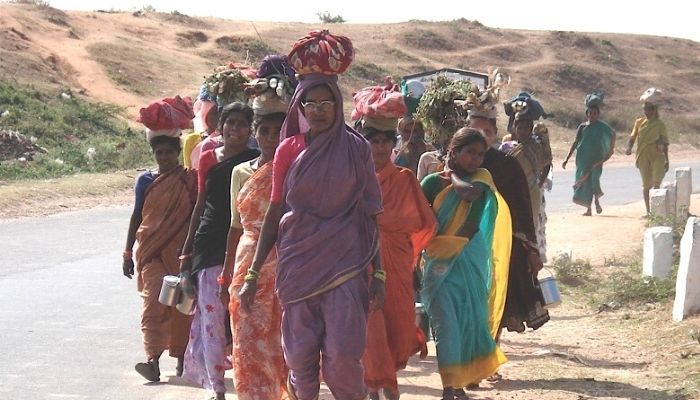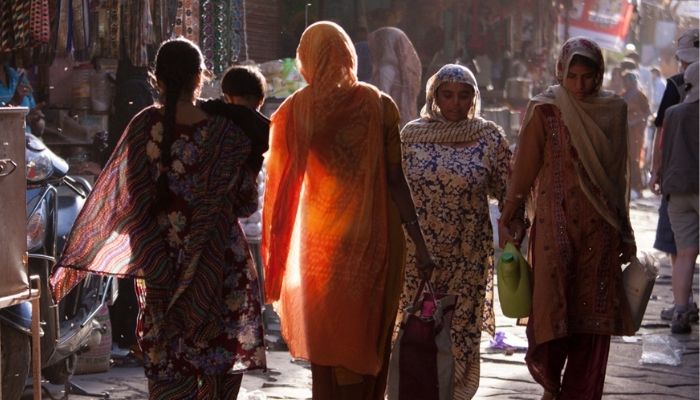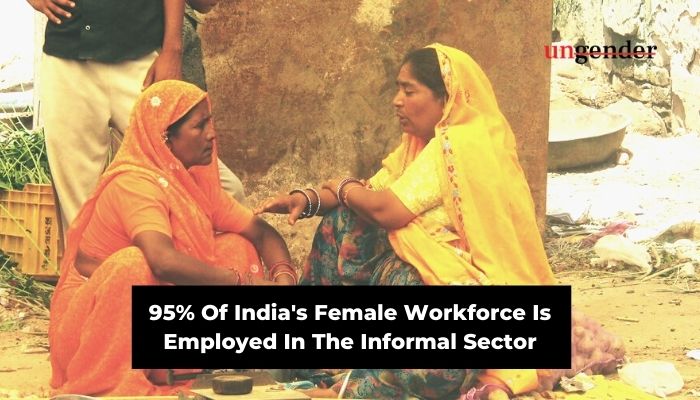Written by: Avanti Deshpande
The #MeToo movement in 2017 saw many survivors of sexual harassment speak about their experiences at workplaces. However, the movement hardly saw the participation of women employed in the unorganised sector due to reasons such as social stigma, lack of awareness, fear of reprisals and uncertainty about a long drawn legal process that might ultimately fail them.
In India, the labour force participation in the informal economy is strongly based on gender lines, with 95 percent of the country’s female workforce employed in the informal sector.
In the unorganised sector, women work as domestic workers, agricultural workers, construction workers, factory workers, street vendors, and others. With such a large chunk of the female labour force working in the unorganised sector, the issue of the effective implementation of the law on sexual harassment at the workplace merits deeper analysis.
Legal Framework
The Justice J.S. Verma Committee Report, 2013 had emphasised the importance of the law on sexual harassment at the workplace as one that should have a wide scope to include “every female member of the national workforce” within its ambit. The report further underlined the importance of including the unorganized sector within its purview and ensuring that the informal sector was not exempted from the legislation.
The International Labour Organization (ILO) recently adopted a landmark treaty in 2019, namely the Violence and Harassment Convention that put forward the concept of the “world of work” and set global standards of response to violence and harassment at workplaces. Before this Convention, there was no international legal instrument specifically dealing with violence and harassment at workplaces.
The Convention has a wide scope, covering both the formal and informal economies and includes all employees as well as “persons working irrespective of their contractual status, persons in training, including interns and apprentices, workers whose employment has been terminated, volunteers, job seekers and job applicants, and individuals exercising the authority, duties or responsibilities of an employer.” The Convention was adopted with an overwhelming majority of votes, including India voting in its favour.
As for domestic legislation, the law on sexual harassment at the workplace is codified under the Sexual Harassment of Women at Workplace (Prevention, Prohibition and Redressal) Act, 2013 (“the POSH Act”) which provides victims with a civil remedy for sexual harassment. The POSH Act recognizes that every woman has a right to a safe and secure working environment, free from hostility and humiliation, irrespective of age and employment status. The law covers women working in all capacities whether that may be regular, temporary, ad hoc, or on a daily wages basis.
Section 2(p) of the POSH Act defines the unorganised sector as a workplace where an enterprise is owned by individuals or self-employed workers and is engaged in the production or sale of goods or providing service of any kind whatsoever, where the number of workers employed by such enterprise is less than ten. Simply put, a workplace that employs less than ten people is classified under the unorganised sector.

The Importance Of Local Committee
The redressal mechanism for tackling complaints of sexual harassment at the workplace in the unorganised sector is found in Section 7 of the POSH Act which discusses the composition, tenure, and other terms and conditions of the Local Committee (LC).
The LC is a district level committee having powers equivalent to that of a civil court. It is constituted by the District Officer (who can be a District Magistrate, Additional District Magistrate, Collector, or Deputy Collector) and receives complaints of sexual harassment against the employer himself or from workplaces having less than ten employees.
Further, domestic workers are separately defined under Section 2(e) of the POSH Act. With regards to domestic workers, LC refers the complaint to the police for registering a case within seven days, under Section 509 of the Indian Penal Code, 1860 (word, gesture or act intended to insult the modesty of a woman).
As per the provisions of the POSH Act, the government is also responsible for developing training and educational material, holding awareness programmes, advance the understanding of the common public concerning the law, publicise the provisions of the Act and conduct orientation and training programmes for members of the LCs.

Furthermore, under Section 23, the relevant government authorities are also expected to monitor the implementation of the POSH Act as well as maintain proper records of the cases filed and disposed off with regards to sexual harassment at the workplace. While these provisions in themselves are good, whether they are being implemented effectively is another matter entirely.
Evaluating The Effectiveness Of The Law
Women workers in the informal economy are one of the most vulnerable groups in the labour force in the country. The unorganised sector constitutes a significant proportion of socially and economically underprivileged women in India. Often, these women are the primary earners for their families; they have no choice of whether they want to work, but they need to work for their sheer survival.
Further, keeping in mind that more than 90 percent of all working women in India are employed in the unorganised sector, evaluating the work of LCs is crucial to understand whether the POSH Act is being implemented effectively or not.
In comparison to an Internal Complaints Committee (ICC) which are constituted in private organisations, i.e. organised sector, LCs are relatively more powerful as they function in tandem with the state machinery and have jurisdiction over the entire district for which they are constituted, while the jurisdiction of ICCs is limited to their particular organisation.
The lack of seriousness on part of the government machinery to supervise the effectual administration of the Act is reflected in the abysmal figures of existing LCs (only 29 percent) around the country.
Various reasons such as lack of awareness about the law, lack of confidence in the complaints and redressal mechanism, stigma, embarrassment, fear of reprisal contribute to a very low reporting rate of incidents of sexual harassment at the workplace.
Considering that district level LCs are the only recourse for women working in the informal sector, there is an urgent need of ensuring the setting up of LCs and their proper functioning across the country.
In 2017, a PIL was filed in the Supreme Court by the NGO Initiatives for Inclusion Foundation seeking the effective implementation of the POSH Act and is still pending before the Apex Court (Initiatives for Inclusion Foundation & Anr. v. Union of India & Ors. W.P. (C) 1224/2017).
The petition submitted that with respect to the constitution of LCs, only five states (namely, Madhya Pradesh, Kerala, Karnataka, Haryana, and Chhattisgarh) and two Union Territories (namely Daman and Diu and Dadra and Nagar Haveli) were able to provide proper details regarding the LCs constituted in their respective jurisdictions.
The petition further submitted that none of the states were able to furnish information concerning efforts taken by their respective state governments to publicize and create awareness about the POSH Act.
Another public interest litigation (PIL) was filed in 2017 before the Madras High Court (R Karuppusamy v. State of Tamil Nadu & Ors. W.P. 106340/2017) to bring to light the lacklustre implementation of the POSH Act in the state of Tamil Nadu, particularly at mills and factories. The Court directed the Collectors of all districts in the state to file individual reports outlining their efforts to constitute LCs to deal with complaints of sexual harassment at workplaces.
To ensure compliance with the POSH Act, the petition submitted three solutions to rectify the present situation. First, the proper constitution of LCs, second, the appointment of nodal officers in each district comprising blocks, talukas, tehsils in rural areas and ward or municipality in urban areas, and lastly the proper dissemination of information and spreading awareness regarding the POSH Act.
The Way Forward
One of the biggest flaws with the law on sexual harassment at workplaces is the lens through which it is viewed. The POSH Act essentially views the issue of sexual harassment at the workplace as a “women’s issue” and not as a labour issue. There is hardly any engagement of the Ministry of Labour and Employment with it and the issue is instead handled by the Ministry of Women and Child Development (WCD).
This is inherently problematic because by categorising sexual harassment experienced at workplaces as a women’s issue, the focus is placed largely on the women, making women the problem, and takes away from the real problem which is hostile workplaces. This greatly diminishes the importance of the context in which the harassment is experienced – the workplace.
The law regarding sexual harassment at workplaces is crucial to ensure that workplaces that have traditionally been male dominated spaces are inclusive and welcoming environments for women. Changing the perspective with which sexual harassment at workplaces is viewed and embracing it as a labour issue will be a significant step towards more inclusive workplaces.
To remedy the current situation, it is imperative that the government takes comprehensive action that involves all stakeholders to ensure the implementation of the law.
Some of the recommendations that the government should consider, include the following:
– ensuring the setting up of LCs,
– monitoring LCs to ensure that they are functioning properly,
– allocating a separate budget to LCs for their operations,
– enforcing sanctions in case of non-compliance with the law,
– collecting and publishing data annually on the number of incidents of sexual harassment at workplace,
– conducting audits regarding the working of LCs including the number of cases disposed off and training programmes conducted,
– facilitating dialogue between civil society organisations and workers organisations/unions to make sure that working women are aware of their rights and the redressal mechanism under the law, and increase the general public’s understanding of the law by publicizing it.

India would also do well to ratify the ILO Convention on Violence and Harassment, 2019, and take appropriate steps to bring the national legislation in line with the global standards set out in the Convention.
After the #MeToo movement, a Group of Ministers (GoM) was formed to review the POSH Act. The GoM finalised its recommendations in January 2020, but they are yet to be put up for public comments. These recommendations will hopefully fill in the existing lacunae in the law.
It is safe to say that although the POSH Act exists on paper, its object of preventing sexual harassment and providing women with a redressal mechanism for their grievances has not been fully actualized. With a change of approach towards the issue, streamlining the provisions of the domestic legislation with international standards, and vigorous efforts of publicizing the provisions of the law, the women working in the unorganised economy stand a chance of realising their right to work in a safe environment.
About the author: Avanti Deshpande is a penultimate year law student at ILS Law College, Pune. Her main interest areas are human rights, gender laws and international law.
_
Images used for representation only.
Credits: Digital Aesthetica/saturnism/Dani Venn/Riccardo Romano on Flickr.
Ungender Insights is the product of our learning from advisory work at Ungender. Our team specializes in advising workplaces on workplace diversity and inclusion. Write to us at contact@ungender.in to understand how we can partner with your organization to build a more inclusive workplace.










